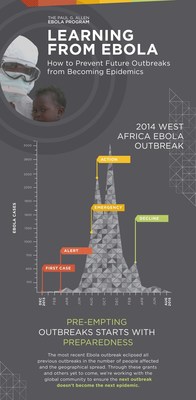SEATTLE, Oct. 7, 2015 /PRNewswire/ -- It's been nearly a year since philanthropist and entrepreneur Paul G. Allen pledged $100 million to help tackle the Ebola outbreak in West Africa, the single largest private gift to fight the disease. While critical progress has been made over the past year, the 2014 West Africa Ebola outbreak exposed significant gaps in the world's ability to effectively respond to global health crises. Past experience suggests that the world is likely to confront another major outbreak fueled by similar challenges confronted in this outbreak: gaps in infrastructure and logistics, a lack of data and coordination, and inadequate diagnostics.

Todayin response to Mr. Allen's call to action for ideas on how to overcome these challenges and get ahead of the next outbreakVulcan Inc.'s Paul G. Allen Ebola Program is awarding seven grants, totaling $11 million, to organizations that are taking innovative approaches to tackling these gaps. The grants, which are intended to disrupt the cycle of epidemics and shorten the time in which the world responds to health crises, are part of Mr. Allen's efforts to help ensure that tools are in place to prevent future outbreaks from escalating into epidemics.
Paul G. Allen Ebola Program Grants:
Emergency infrastructure and logistics:
World Food Programme With an $829,865 grant, the World Food Programme will leverage its experience with interagency humanitarian logistics and extensive in-country presence to develop a virtual supply chain ahead of future pandemic response operations. The project will enable the wider humanitarian community to more quickly secure much-needed goods and services in future pandemic emergency operations.
The Food Protection and Defense Institute, University of Minnesota With a $1 million grant, the Food Protection and Defense Institute will utilize big data and predictive analytics to identify emerging disease outbreaks and improve the resilience of health care supply chains.
Baylor College of Medicine With a $1.5 million grant, as part of its overall concept for a rapidly deployable Ebola treatment facility, Baylor College of Medicine will design and build pharmacy and lab pod prototypes and design a triage unit with a more space-efficient, expandable structure for easier deployment, setup and multifunctionality.
Diagnostics:
Chembio With a $2.1 million grant, Chembio will use its patented Dual Path Platform (DPP®) technology to develop a point-of-care diagnostic to simultaneously detect malaria, dengue, Ebola, Lassa, Marburg and chikungunya, using a single patient sample.
BD (Becton, Dickinson and Co.) With a $2.79 million grant, BD will partner with an international set of academic institutions to develop a cost-effective, easy-to-use and rapid diagnostic test for the Ebola virus disease with the ability to investigate other potential sources of fever.
Foundation for Innovative New Diagnostics With a $1.97 million grant, FIND will provide technical support as well as access to critical reagents and clinical specimens, and coordinate feasibility studies of newly developed diagnostic tests in their settings of intended use.
Data strengthening and coordination:
UNOCHA With a $1.02 million grant, UNOCHA will integrate data systems and offer data services to partners across West Africa. It will also enhance its open data platform, the Humanitarian Data Exchange, with new features for data sharing and analysis.
"The 2014 West Africa Ebola outbreak exposed significant gaps in the world's ability to effectively contain emerging infectious diseases," said Barbara Bennett, Vulcan Inc. president and chief operating officer. "We're committed to helping ensure the next outbreak doesn't become the next epidemic. While the world cannot stop every outbreak, we can apply innovative solutions to more effectively fill the gaps and better prepare communities worldwide to quickly stamp out global health threats."
The Seattle-based Paul G. Allen Ebola Program team comprises seasoned experts in public health and emergency response. The program partners with infectious disease leaders and practitioners worldwide, and draws from a myriad of resources and experts in Mr. Allen's broader organization, Vulcan Inc.
For more information:
For more information about the Paul G. Allen Ebola Program, please visit http://www.paulallen.com/interests/philanthropy/key-initiatives/ebola-program.
FOR MEDIA INQUIRIES:
The Paul G. Allen Ebola Program / Vulcan Inc.
Press line: press@vulcan.com
-OR-
Michelle Jahnke, Edelman
Michelle.Jahnke@Edelman.com
503.471.6847
Photo - http://photos.prnewswire.com/prnh/20151007/274832-INFO
To view the original version on PR Newswire, visit:http://www.prnewswire.com/news-releases/the-paul-g-allen-ebola-program-awards-11-million-in-new-grants-continuing-its-support-of-innovative-solutions-to-help-prevent-future-outbreaks-from-becoming-epidemics-300155538.html
SOURCE Paul G. Allen Ebola Program
 Help employers find you! Check out all the jobs and post your resume.
Help employers find you! Check out all the jobs and post your resume.




